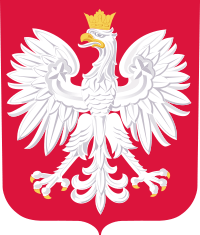Supreme Court of Poland
The Supreme Court (Polish: Sąd Najwyższy) is the highest court in the Republic of Poland. It is located in the Krasiński Square, Warsaw.

 |
|---|
| This article is part of a series on the politics and government of Poland |
|
|
Related topics
|
|
|
Function
The Supreme Court supervises the adjudication in:
- General courts: these are district, regional, and appeal courts. They adjudicate in the areas of civil, criminal, family and labour law.
- Military courts: these are circuit and garrison courts. They deal with matters relating to crimes committed by soldiers in active service, civilian employees in military units, and prisoners of war.
The Supreme Court is the court of last resort of appeal against judgements in the lower courts. It also passes resolutions to clarify specific legal provisions and resolve disputable questions in specific cases. These however are not (at least technically) legally binding.
Appointment of judges
The President of Poland appoints Supreme Court judges for an indefinite period. This is done upon a motion of the National Council of the Judiciary. The President also selects the First President of the court from candidates presented by the General Assembly of the Supreme Court. The First President holds office for a six-year term, though he or she may be dismissed by the Sejm upon a motion by the President if found convicted of a crime.
In July 2018 a new law came into force which lowers the mandatory retirement age from 70 to 65. The introduction of this law is contested and the constitutionality of the law is being assessed. Critics have argued the law is aimed at removing non-pliant judges and installing PiS-led government appointees.
2017–2018 Constitutional Crisis
In 2017 the Polish government passed a law which would have forced all Supreme Court judges into mandatory retirement apart from those granted an extension by the Minister of Justice. The bill was passed in the Polish Sejm and the Senate however following mass protests against the bill it was ultimately vetoed by President Andrzej Duda on 24 June 2017. A revised bill reduced mandatory retirement age of judges from 70 to 65. The bill was later signed by President Duda and came into force in July 2018. The law effectively retires 40% of the Supreme Court bench including the First President of the Supreme Court, Malgorzata Gersdorf.
Polish opposition parties, the European Commission, the European Parliament, the Polish Supreme Court, and the National Council of the Judiciary have claimed the law is unconstitutional because it violates the principles of the independence of the judiciary. In August 2018 the Supreme Court sent questions to the European Court of Justice regarding the reforms. Under Union law the court can prevent the State law from coming into force if it undermines the treaties of the European Union regarding judicial independence.
On 17 December 2018, President Duda signed a law that will reinstate the judges who had been forced out of their jobs.[1]
On 8 April 2020 the EU Court of Justice ruled in a court case ("Commission v Poland") that the state of Poland "had failed to fulfil its obligations under EU law". As a result, the Court granted "the Commission’s application for interim measures" which will likely be realised with monetary fines.[2]
List of First Presidents of the Supreme Court
- Stanisław Pomian-Srzednicki (1 September 1917 – 28 February 1922)
- Franciszek Nowodworski (1 March 1922 – 3 August 1924)
- Władysław Seyd (22 September 1924 – 17 January 1929)
- Leon Supiński (17 January 1929 – 1 September 1939)
- Wacław Barcikowski (26 January 1945 – 12 November 1956)
- Jan Wasilkowski (12 December 1956 – 22 May 1967)
- Zbigniew Resich (23 May 1967 – 21 January 1972)
- Jerzy Bafia (21 January 1972 – 1 April 1976)
- Włodzimierz Berutowicz (1 April 1976 – 14 May 1987)
- Adam Łopatka (14 May 1987 – 30 June 1990)
- Adam Strzembosz (1 July 1990 – 17 October 1998)
- Lech Gardocki (17 October 1998 – 18 October 2010)
- Stanisław Dąbrowski (19 October 2010 – 9 January 2014)
- Lech Krzysztof Paprzycki (9 January 2014 – 30 April 2014, acting)
- Małgorzata Gersdorf (30 April 2014 – 30 April 2020)
- Józef Iwulski (4 July 2018 – 20 July 2018, acting – appointed by President Duda Dariusz Zawistowski forced retirement of Gersdorf; installed as 'Acting' First President. Iwulski rejected the appointment and insisted he was only acting under the behalf of Gersdorf during her absence.)
- Dariusz Zawistowski (13 September – 31 December 2018, acting under the behalf of Gersdorf during her absence.)
- (disputed) Kamil Zaradkiewicz (1 May 2020 – 15 May 2020, acting, resignation)
- (disputed) Aleksander Stępkowski (15 May 2020 – 25 May 2020, acting)
- (disputed)[3] Małgorzata Manowska (25 May 2020 – present)
See also
- Constitutional Tribunal of the Republic of Poland
References
- Joanna Berendt; Marc Santora (December 17, 2018). "Poland Reverses Supreme Court Purge, Retreating From Conflict With E.U." NYTimes.com. Retrieved December 18, 2018.
- Court of Justice of the European Union (8 April 2020). "Commission v Poland (Press Release)" (PDF). curia.europa.eu.
- "Sędzia SN Włodzimierz Wróbel: Mamy do czynienia z sytuacją wielkiego alarmu w systemie prawa". 27 May 2020. Archived from the original on 28 May 2020.
External links
| Wikimedia Commons has media related to Highest Court of Poland. |